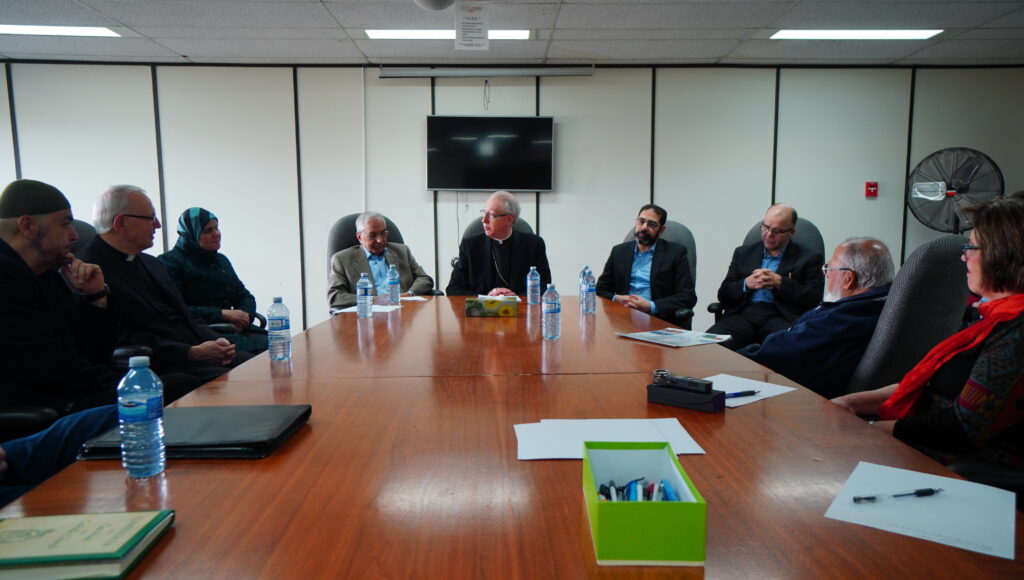As an afternoon sun pierced through the window screen behind him, Archbishop Richard Smith spoke before hundreds of Muslims awaiting their Friday prayers.
It was a rare honour, and an historic moment, for the archbishop to address the faithful in the Rahma Mosque prayer space. It was also profoundly symbolic of the growing relationship between Muslims and Catholics, both locally and across the globe.
“I just found it very humbling and moving to be invited to address them before they began their prayer,” Smith said. “God willing, this will bear good fruit.”
In his March 29th speech, Smith confronted the massacres, assaults and vandalism wrought against many Islamic and Christian communities in the world, but he also emphasized the compassion that faith communities can use to offer comfort during these incidents.
“One the one hand these events might stir us to anger or vengeance, but for people of faith, such events must stir in us a more life-giving response,” Smith said.
“They should stir us all, Christians and Muslims, to embrace one another more closely as sisters and brothers in a common humanity, in a spiritual closeness before our most loving God.”

It’s not the first time Catholic and Muslim leaders have reached out to each other.
The Archdiocese of Edmonton and the Intercultural Dialogue Institute (IDI) cooperate in hosting an annual iftar and friendship dinner at Providence Renewal Centre during the month of Ramadan.
And Archbishop Smith hosted a gathering of Muslim leaders at his home following the January 2017 shootings at a Quebec mosque, as a reminder of their shared values and trust.
Smith said the invitation to visit the Rahma Mosque for the first time and to address the Muslim faithful strongly reflect the willingness and openness of Edmonton’s Islamic community.
It was the latest in a series of meetings between Catholic and Muslim community leaders in Edmonton over the last two years. Catholic community delegates included representatives from the Edmonton Archdiocese, Catholic Social Services and pastors from neighbouring parishes.
After touring the mosque, the attendees gathered in a conference room to reflect on the progress of their relationship thus far, and talk about what could be done to continue it into the future.
“My assessment is that these are not just symbolic visits, they do carry a lot of meaning with them,” said Masood Peracha, chairman of the Edmonton Council of Muslim Communities.
“I believe we have a lot to learn from each other. More specifically, our Muslim community has a lot to learn from some of your services in the area.”
Peracha sees the initiatives of Catholic Social Services as an example that the Muslim community can reflect on in their own work addressing social issues.
Discussions at the Friday meeting largely focused on ways the Muslim-Catholic relationship can gain a more public presence.
Syed Jamal, a member of the Rahma Mosque, said a joint food drive between the mosque and a neighbouring parish could be an effective way to tackle this goal.
“We have to go through some public participation,” Jamal said. “If one day we had a food drive here at the mosque and then the next day we all go to the church – people will see that we are in touch with each other and in support of each other.”
Other suggestions ranged from workshops to showcase the Muslim-Catholic relationship on social media, interfaith tours of places of worship in the city, and an interfaith picnic in the summer at the parking lot of the nearby Good Shepherd Catholic Parish.
Smith said the discussion showed a renewed commitment to bring interfaith dialogue beyond the level of religious leaders and directly into the lives of everyday Catholics and Muslims.
“These things will most of all depend on ordinary Muslims and Christians making a commitment to no longer be strangers, but be friends, neighbours and faithful believers in the most high God,” he said.

